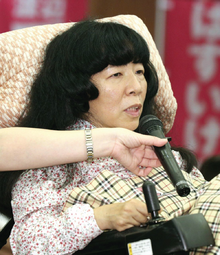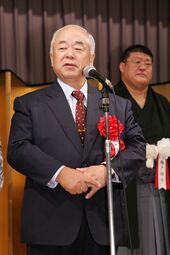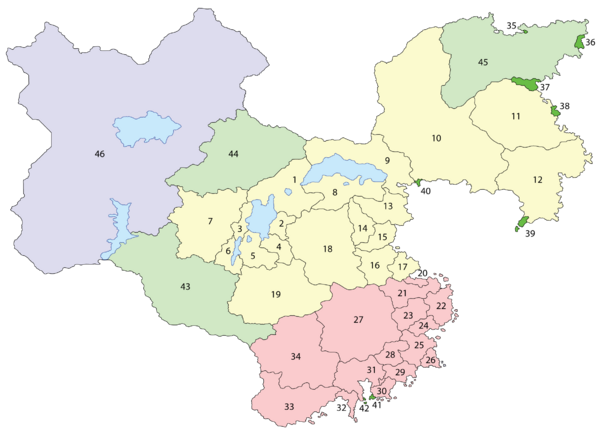User:MichCOdel/Sandbox 1: Difference between revisions
(Created page with "{| class = "wikitable" style = "width:100%;font-size:90%" |- ! style = "width:35%;background:#f5f5f5" | Administrative Divisions of the Kingly State of Lainan ! style = "width...") |
No edit summary |
||
| Line 1: | Line 1: | ||
==Lainan== | |||
{| class = "wikitable" style = "width:100%;font-size:90%" | {| class = "wikitable" style = "width:100%;font-size:90%" | ||
|- | |- | ||
| Line 96: | Line 97: | ||
|} | |} | ||
=South Misai= | |||
==Government and Politics== | |||
===Government=== | |||
{| class="wikitable" style="text-align:left; float:right; margin-right:9px; margin-left:2px;" | |||
|- | |||
| style="text-align:left;"| [[File:Ai-Obama.png|220px]] || style="text-align:left;" | [[File:Eiichi Takamaki.jpg|170px]] | |||
|- | |||
| style="text-align:center;"|[[Ai Obama]]<br /><small>[[President of the Republic of Misai|President]] since 2018</small> | |||
| style="text-align:center;"|[[Eiichi Takamaki]]<br /><small>[[Premier of the Republic of Misai|Premier]] since 2016</small> | |||
|} | |||
The Republic of Misai is a {{wp|unitarism|unitary}} {{wp|constitutionalism|constitutional}} {{wp|republic}} with the president as the head of state and the premier as head of government. Highest political power in South Misai resides in the democratically-elected {{wp|unicameral}} {{wp|legislature}}, the [[Grand Diet of the Republic of Misai|Grand Diet]] ({{wp|japanese language|Hanasenese}}: 大議会, ''Dai Gikai''). | |||
The President of the Republic of Misai ({{wp|Japanese language|Hanasenese}}: 美西共和国大統領, ''Misai Kyōwakoku Daitōryō'') is largely a symbolic role but it still retains some appointive powers as well as power over foreign policy however, even this is shared with the [[Misai Council]]. The presidency is officially defined as the head of state of the Republic of Misai as well as the head of the Republican Armed Forces in the constitution. Over most of its history, South Misai had a {{wp|semi-presidential system}} but in recent decades the powers of the president have been diminished significantly. The current sitting president of South Misai, [[Ai Obama]] is the first democratically-elected disabled head of state as she has cerebral palsy and is paralysed from her neck down but retains the use of her right hand. | |||
Executive power in South Misai primarily resides in the [[Premier of the Republic of Misai|Premier]] ({{wp|Japanese language|Hanasenese}}: 美西共和国の首相, ''Misai Kyōwakoku no Shushō'') who wields it with the consent of the [[Grand Diet of the Republic of Misai|Grand Diet]]. The premier is appointed by the [[Grand Diet of the Republic of Misai|Grand Diet]] to a term of 5 years that is indefinetly renewable. The premier is usually the individual who is most trusted by the majority of the representatives of the [[Grand Diet of the Republic of Misai|Grand Diet]]. This means that the premier is most often the head of the largest political party or multi-party coalition. It is up to the Premier to assemble a cabinet whose members are appointed by the president with the premier's recomendation. | |||
Judicial power in South Misai resides in the Supreme Administrative Court ({{wp|Japanese language|Hanasenese}}: 最高行政裁判所, ''Saikō Gyōsei Saibansho''), the memebers of which are appointed by the president. Unlike in some other countries, the Supreme Administrative Court is an apolitical institution. A member of the Supreme Administrative Court can serve their an indefinite term, yet most members choose to retire after a ''de facto'' term of 18 years. | |||
===Administrative Divisions=== | |||
===Foreign Relations=== | |||
Revision as of 23:10, 7 March 2020
Lainan
| Administrative Divisions of the Kingly State of Lainan | Level | Number, Name, Capital | ||
|---|---|---|---|---|
| Phu (府, phủ) | ||||
| Southern Phu (府南, phủ nam) |
| |||
| Mandate City (城庯任務, thành phố nhiệm vụ) |
||||
| Autonomous Region (區自値, khu tự trị) |
||||
| Constituent Kingdom (王國成逅, vương quốc cấu thành) |
| |||
South Misai
Government and Politics
Government
 |

|
| Ai Obama President since 2018 |
Eiichi Takamaki Premier since 2016 |
The Republic of Misai is a unitary constitutional republic with the president as the head of state and the premier as head of government. Highest political power in South Misai resides in the democratically-elected unicameral legislature, the Grand Diet (Hanasenese: 大議会, Dai Gikai).
The President of the Republic of Misai (Hanasenese: 美西共和国大統領, Misai Kyōwakoku Daitōryō) is largely a symbolic role but it still retains some appointive powers as well as power over foreign policy however, even this is shared with the Misai Council. The presidency is officially defined as the head of state of the Republic of Misai as well as the head of the Republican Armed Forces in the constitution. Over most of its history, South Misai had a semi-presidential system but in recent decades the powers of the president have been diminished significantly. The current sitting president of South Misai, Ai Obama is the first democratically-elected disabled head of state as she has cerebral palsy and is paralysed from her neck down but retains the use of her right hand.
Executive power in South Misai primarily resides in the Premier (Hanasenese: 美西共和国の首相, Misai Kyōwakoku no Shushō) who wields it with the consent of the Grand Diet. The premier is appointed by the Grand Diet to a term of 5 years that is indefinetly renewable. The premier is usually the individual who is most trusted by the majority of the representatives of the Grand Diet. This means that the premier is most often the head of the largest political party or multi-party coalition. It is up to the Premier to assemble a cabinet whose members are appointed by the president with the premier's recomendation.
Judicial power in South Misai resides in the Supreme Administrative Court (Hanasenese: 最高行政裁判所, Saikō Gyōsei Saibansho), the memebers of which are appointed by the president. Unlike in some other countries, the Supreme Administrative Court is an apolitical institution. A member of the Supreme Administrative Court can serve their an indefinite term, yet most members choose to retire after a de facto term of 18 years.
